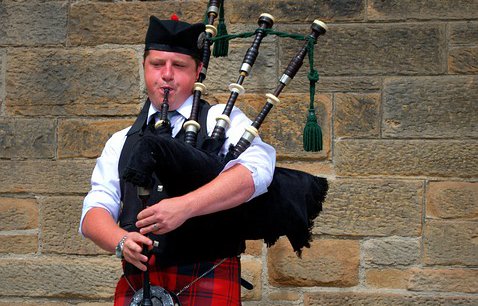Commemorate the birthday of Scotland’s national bard Robert Burns on 25 January and celebrate his oral tradition by sharing poems and Scottish folktales…
Robert Burns
Known fondly as ‘Rabbie’, Burns was a poet who lived in the late 1700s. He is famous for his poems and songs in the Scots language, and in English with a Scots dialect. Have you ever sung Auld Lang Syne on New Year’s Eve? Burns put pen to paper to record this widespread Scottish folk song, formalising the lyrics and melody into the song we still sing today.
Burns Night
Millions of people still celebrate Robert Burns’ birthday on Burns Night - 25 January. Traditionally these celebrations involve eating haggis (a traditional savoury pudding, a bit like a big round sausage), neeps and tatties (turnips and potatoes), lots of singing, dancing, bagpipe music, and sharing poems and stories late into the night.
Hold your own Burns Night celebration at home!
- Watch the Scottish Folk Tales episode of the Young Readers Story Club
- Write your own poem. You could write in Scots dialect, or try writing in your own dialect
- Play some bagpipe music and have a dance party in your living room! Below you can find a YouTube playlist of bagpipe versions of songs you might know.
- Share stories and poems with your family. Take it in turns to read lines from our favourite Robert Burns poems below, or you could share a poem or story that you have written yourself!
Bagpipe playlist
We’ve collected links to YouTube videos of some amazing pipers covering well known songs:
- Shake it Off, Taylor Swift
- Bad Guy, Billie Eilish
- Wake Me Up, Avicii
- We Will Rock You, Queen and Eye of the Tiger, Survivor
Scots dialect
Burns is famous for writing in Scots dialect - that means the poems are written on the page exactly as they sound when spoken in a Scottish accent, and contain some words that were just used in Scotland 250 years ago!
Download the audio files below and have a go at rewriting the extracts from Robert Burns’ poems into your own dialect.
If you don’t know some of the Scots dialect words, don’t worry - have a guess! We’ve given some clues in brackets to help.
To a Louse (extract)
Robert Burns, 1785
Ha! whare ye gaun (going), ye crowlan ferlie!
Your impudence protects you sairly (barely):
I canna say but ye strunt rarely,
Owre (over) gawze and lace;
Tho’ faith, I fear ye dine but sparely,
On sic (such) a place.
Ye ugly, creepan, blastet wonner (wonder),
Detested, shunn’d, by saunt (saint) an’ sinner,
How daur (dare) ye set your fit upon her,
Sae fine a Lady!
Gae somewhere else and seek your dinner,
On some poor body.
What does the word sound like when you say it out loud? Does it remind you of any words you know? What word would you use to describe what Robert Burns is describing?
Address to a Haggis (extract)
Robert Burns, 1786
Fair fa’ (good luck to) your honest, sonsie (plump) face,
Great Chieftan o’ the Puddin-race!
Aboon them a’ ye tak your place,
Painch (stomach), tripe or thairm: (intestines)
Weel are ye wordy (worthy) o’ a grace
As lang’s my arm.
The groaning trencher (bowl or plate) there ye fill,
Your hurdies like a distant hill,
Your pin wad help to mend a mill
In time o’ need,
While thro’ your pores the dews distil
Like amber bead.
